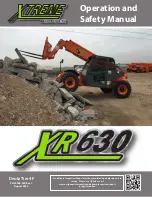
5-23
Safe operation is the responsibility of the operator.
WATCH WHERE YOU ARE GOING. DON’T GO IF YOU CAN’T SEE...
Before driving, check all around to be sure that your intended path of travel is clear of
obstructions and pedestrians.
LOOK WHERE YOU DRIVE. Watch out for pedestrians, other vehicles, obstructions
(especially overhead), and drop-offs. If the load blocks your view, drive backwards, except
up slopes.
Do not allow anyone to stand or pass under the load or raised forks.
Watch for people in your work area even if your truck has warning lights or alarms. They may not
watch for you.
Sound horn at intersections and wherever vision is obstructed.
Do not drive a truck up to anyone standing in front of an object.
PROTECT YOURSELF AND THOSE AROUND YOU...
Operate the truck only from the designated operator's position. Stay within the confines of the lift
truck profile dimensions. Keep all body parts inside the operator's compartment and away from
the danger of passing obstructions. Keep inside the cabin.
A cabin is intended to offer protection to the operator from falling objects, but cannot protect
against every possible impact. Therefore, it should not be considered a substitute for good
judgement and care in loading, handling, storage, etc.
Keep clear of the mast and lift mechanism. NEVER reach into or put hands, arms, legs, or
head into or through the mast structure or near the carriage or lift chains. Never put any part
of your body between the mast and the truck.
Don’t use the mast as a ladder.
Keep all other persons clear of the load and mast mechanism while attempting to handle a
load.
NO RIDERS...
Do not carry passengers. The operator is the only one who should be on the truck.
ALWAYS BE IN FULL CONTROL OF YOUR LIFT TRUCK...
Never operate a lift truck or its attachments if you are not in the designated operator's position.
Never operate a lift truck when your hands and feet are wet or greasy.
Always pick the smoothest travel route for your lift truck. Avoid bumps, holes, slick, spots, and
loose objects or debris in your path that may cause the truck to swerve or tip. If these conditions
are unavoidable, slow down and carefully drive past them. Slow down for wet or slippery surfaces.
Avoid any sudden movement, it can cause the truck to tip-over.
Start, stop, travel, steer, and brake smoothly.
Operate your lift truck under all conditions at a speed that will permit it to be brought safely to a
stop.
1)
(1)
(2)
(3)
2)
(1)
ö
3)
(1)
4)
(1)
(2)
(3)
(4)
(5)
11. OPERATING SAFELY
















































